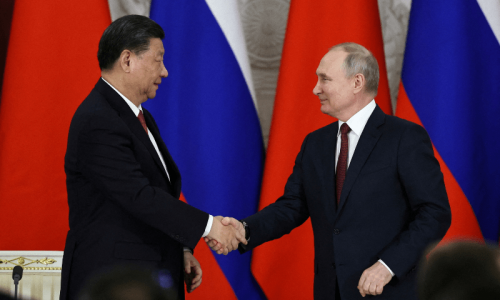BAGHDAD: Prime Minister Nuri al-Maliki’s vow to track down and arrest PKK rebel leaders in northern Iraq will fail unless the region’s Kurdish leaders decide it is in their interest to help him appease Turkey.
Maliki’s promise of firm action was delivered at a weekend conference of Iraq’s neighbours in Istanbul in an effort to avert a major military incursion by Turkish forces to crush Kurdish rebels responsible for a series of cross-border raids.
Maliki has been under mounting pressure from Turkey and the United States to tackle Kurdistan Workers Party (PKK) guerrillas in their remote mountain hideouts in northern Iraq.
But he has little sway over the semi-autonomous Kurdistan Regional Government (KRG). He is also dependent on the Kurds for political support, while two Kurdish brigades, some 6,000 soldiers, are helping to keep the peace in Baghdad.
“There is no way the government is going to force the Kurds to do anything. They could use coercive measures, but then the Kurds can bring down the government,” said Joost Hiltermann, an Istanbul-based analyst for the International Crisis Group.Kurdistan’s government has no stomach for a fight with the PKK, which successfully resisted Turkish incursions in 1995 and 1997 and fought Iraqi Kurdish parties in the 1990s.
Kurdish President Masoud Barzani, Iraqi President Jalal Talabani and other Kurd leaders are also reluctant to be seen to be fighting fellow Kurds, a non-Arab minority living in a mountainous area straddling Iraq, Iran, Syria and Turkey.
“Barzani and Talabani have become the figureheads of a pan-Kurdish movement. They are seen as the success stories of getting autonomy, a de facto state in Iraq,” said Gareth Stansfield, a Kurdish expert and professor of Middle East politics at the University of Exeter in England.
“Because of that they have a lot of credibility that they don’t necessarily want to damage.”
Keeping the PKK in the mountains is also a useful bargaining chip for the Kurds in any future negotiations with Turkey.
“They are going to need to get Turkey to compromise over a number of issues, including Kirkuk and their political future,” said Soner Cagaptay, director of the Washington Institute for Near East Policy’s Turkish Research Programme.
Kurds want to incorporate the Iraqi oil-producing city of Kirkuk into Kurdistan, while Turkey fears this will help fund an independent Kurdish state and fuel Kurdish separatism.
Analysts agree that Barzani, whose inflammatory rhetoric has infuriated the Turks, will now be under pressure from Washington to take some visible steps toward curbing the PKK activities.
“The only one who can lean on the KRG is the American government. Now the Americans, if they want to keep Turkey as a friend, they need to tell the Kurdish leadership: ‘You need to do something’,” said Hiltermann.
“It is a geopolitical nightmare for the Americans,” said Stansfield. “Their most important ally in Iraq, the Kurds, are now in a position where they may be attacked by one of their most critical allies in the region, Turkey.”
The Kurdish authorities closed the offices of a political party linked to the PKK at the weekend and helped secure the release of eight Turkish soldiers captured by the rebel group.
Checkpoints are also being set up on roads leading to the Qandil mountains to block the flow of supplies to the rebels and curb their movements, but local officials say the PKK has vast stores of food and fuel to keep them going for months.
These measures fall far short of Turkey’s main demands — shutting down the PKK bases and arresting its leaders.
Military action by Iraqi and US forces is simply not on the cards, analysts say, but arresting Kurdish leaders is doable. Barzani has said he will refuse to hand over any PKK guerrillas to Turkey.
“The Kurds have the intelligence and resources to capture the PKK leadership, who are often reported to be walking around Arbil,” said Cagaptay. “The new PKK leader, Murat Kirayilan, has kidney problems and goes to Arbil for dialysis treatment.”
The Kurds will also likely be using any leverage they have over the PKK to get them to halt attacks to give them breathing space and allow Ankara to placate the Turkish public.
“For now, the PKK is going to lie low and stop its violence, then the snows will come and after a while there will be quiet,” said Hiltermann. “Everyone will have forgotten what was going on and go back to the same old situation.”—Reuters











































Dear visitor, the comments section is undergoing an overhaul and will return soon.